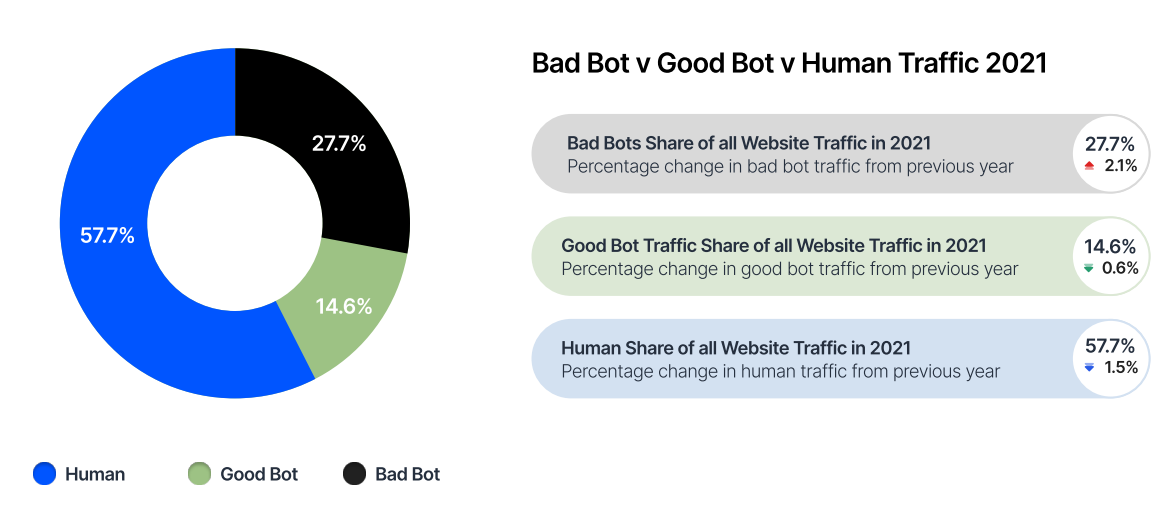IT is a relatively new industry, and is still somewhat misunderstood by most people who don’t specifically work with it. IT, or “information technology”, involves anything to do with using systems such as computers and telecommunications to store, send, and retrieve data. As such a broad subject, IT encompasses many aspects of both work and home life. Yet, IT is still largely a grey area to many. Below are 8 interesting IT facts you may find quite surprising to learn.
1. There are more bots than humans on the net
In 2012, Imperva published a study suggesting that 51 per cent of Internet traffic was generated by non-humans. In 2022, the most recent of Imperva’s Bot reports covering the 2021 period estimated that 42.3 per cent of total web traffic consisted of bots, with 27.7 per cent of total web traffic being bad bot traffic. At a glance this may seem like an improvement, but during the pandemic, some operators have experienced as much as a 60% increase in online traffic compared to before the crisis.
Of the “bad bots” online which currently make up over a quarter of all internet traffic, their purpose is malicious. These bots operate with the intent to conduct damaging acts such as spam or phish information. Such data shows the importance of IT professionals in protecting and preserving normal Internet functions.
2. Cloud-based storage still exists somewhere
When you store information on the Cloud, it’s easy to forget that this data has to exist somewhere. Even though it’s not officially stored on your own device, it is stored somewhere in the world.
These storage areas are known as server farms and run around the clock to ensure anyone can access their data at any time. Typically held in large warehouses, server farm locations are not usually disclosed to customers.
3. IT isn’t as new as it seems
While technology has allowed for advancements that are almost impossible to keep up with, IT itself isn’t as new as many might think.
Computers really began to generate interest in the early 1950s. Additionally, the first mobile phones were sold in the 1980s, and even the mouse has been around since the 1960s.
4. IT specialists are hugely varied
According to a 2013 report from the Australian Computer Society, there was a total of 597,700 workers in the ICT field in the country, which signified an increase of nearly 10 per cent over 2012. These numbers include manufacturers, wholesalers, developers and support persons.
The population of Australia in 2013 (including retirees and children) was 23.13 million. Therefore, the number of workers in ICT made up approximately 2.5 per cent of the entire population.
An IT specialist could know everything there is to know about working with Cloud-based services, and nothing about app development, or vice versa. They could work in security, automation, compliance, architecture SAP, or something else.
As the field is so diverse and all-encompassing, it’s rare for an IT professional to be a master of many of these areas at once, although plenty of skills are transferrable.
5. IT staff are not magicians
Ask anyone in IT – they’ll have a story of a time someone asked for an impossible solution.
If your computer does not operate a specific system or software, your IT staff can’t suddenly make it work. They know what they are doing and are often natural problem solvers. But, just because it seems like they have the magic touch when it comes to technology, there are usually systems and software in place to make it possible.
7. IT training should be ongoing
Once you have a great IT professional on board at your company, keep in mind that you should be on the lookout for further training opportunities.
When managers assume their IT staff will be able to tackle new technology as it comes through without additional training, it’s an assumption that can cost the company time and money. As the industry moves forward so quickly, IT staff need to continue their training.
8. IT services are often priced on value, not cost
Work completed by IT professionals is not always easy to calculate in terms of financial return, which is why some people think IT investment is too costly for their company.
In reality, an IT worker tends to have the ability to reduce other costs around the department and to contribute to new forms of revenue streams that help boost income.














